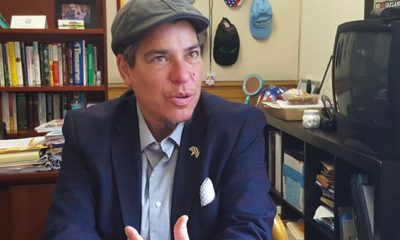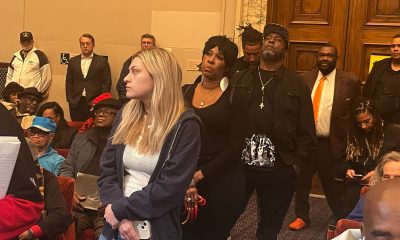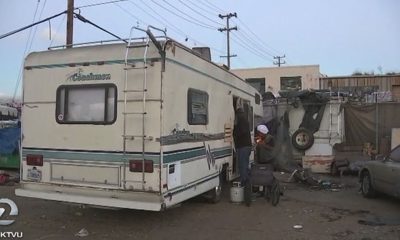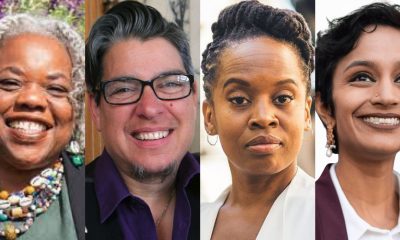Featured
Questions About Oakland Promise: If It Wasn’t a Nonprofit, What Was It? What Happened to the Money for Scholarships for Kids?

Questions continue to surface about the organization and accountability of “The Oakland Promise,” Mayor Libby Schaaf’s signature initiative that has raised millions of dollars since 2015 to help low-income families “to triple the number of high school graduates who …complete college by the year 2024.”
Though the promise’s lofty goal is widely popular among Oakland residents, that support has not silenced demands for full transparency about what the legal status is of this organization is—which has operated out of the Mayor’s Office — and how it is spending public money and resources.
Oakland Promise is now widely perceived as a nonprofit organization — but that has not always been the case, at least until recently.
The organization was not listed as one by Guidestar, a website designed to provide “the highest-quality, most complete nonprofit information available.” Nor was Promise registered as a nonprofit with the State Attorney General.
According to an email to the Oakland Post on Aug. 29, 2018, Oakland Promise was described by its backers as a “public-private effort” backed by four organizations: the City of Oakland, the Oakland Unified School District, the East Bay College Fund and the Oakland Public Education Fund.
Since July, however, Oakland Promise has become a nonprofit, merging with the East Bay College Fund and taking over its nonprofit status, according to the East Bay Times. Mialisa Bonta, president of the Alameda Unified School Board and wife of Assemblyman Rob Bonta, has become the organization’s CEO, taking over the leadership from David Silver, who is a city staffer in the Mayor’s Office.
Another question surrounds what has happened to the money the city gave Oakland Promise to set up college saving accounts for children.
A copy of a Public Records Act request forwarded to the Post asked for information about the total of $1,150,000 that the city budgeted in 2015 to Oakland Promise for these savings accounts.
But according to the city’s Finance Department on Aug. 16, “The city has not yet made payments on behalf of Oakland Promise from funds earmarked for this program in the adopted budgets for 2016-17, 2017-18 (and) 2018-19. The requested documents (canceled checks) do not exist.”
Council President Rebecca Kaplan explained in an email why she has asked City Auditor Courtney Ruby to audit Oakland Promise.
“Many people have been asking the questions I sent to the auditor, and many members of the public — even the League of Women Voters — have expressed concern about the Oakland Promise funds. It is perfectly reasonable for anyone to want to know where the money is. This is large amounts of tax-payer funds that were promised to be used to set up college savings accounts for each Oakland kid, as they enter kindergarten.” “We want to know where the money is, and where the college savings accounts are — which were supposed to be set up each year, starting in 2015,” Kaplan said. “By now, they should have grown a lot if they had been set up as promised and as funded in the City of Oakland budget, for the Kindergarten to College Program.”
Asked about Kaplan’s request for the audit, the Mayor’s Office replied, “Kaplan wants Oakland taxpayers to fund her petty political vendetta masquerading as an audit. And tragically she’s targeting the Oakland Promise — a program started by the City of Oakland to send low-income kids to college with scholarships and mentors. She needs to immediately withdraw this taxpayer funded political score settling because it hurts taxpayers and kids.”
Responding, Kaplan said, “The Mayor’s Office says I’m asking for tax payer money, but that is flatly false. I am not requesting any money. I have asked our independently elected City Auditor for help getting information about where the college savings accounts they promised for Oakland youth are. The auditor is paid a regular salary.”
The Alameda County League of women Voters (LWVO) expressed concerns about Oakland Promise when Mayor Schaaf and the Promise organization backed Measure AA last November, which would have created a $198 parcel tax to provide funding for Oakland Promise for 30 years. In its voters’ guide, the League took a neutral position, saying, “We found it unclear how moneys in the Oakland Promise Fund would be spent.”
Measure AA won more than 50 percent of the vote but failed to pass because it needed a two-thirds majority. That ruling is now being challenged in court, and according to observers, the case may take three years and end up at the state Supreme Court.
According to its website (Oaklandpromise.org), the organization consists of four programs:
• Brilliant Babies, “a college savings account seeded with $500 as an early investment and source of inspiration for [parents] baby’s bright future,” according to Oakland Promise;
• Kindergarten to College, which “Open(s) an early college scholarship seeded with $100 for all Oakland public school kindergarten students;”
• Future Centers, which creates college and career advising center on middle school and high school campuses, replacing services lost by the public schools as a result of cutbacks;
• College Scholarships and Completion, which provides $1,000 annual scholarships to students going to community colleges and up to $4,000 a year for students attending four-year colleges.
Questions that remain to be answered are how many $500 accounts have been set up through Brilliant Babies; how many $100 scholarships have been established through Kindergarten to College; how many Future Centers have been set up and how many hours of support they have provided to students; as well as how many community college and four-year college scholarships have been awarded.
During the years before Oakland Promise became a nonprofit, the Oakland Public Education Fund served as the organization’s fiscal sponsor. The Ed Fund can share budgetary information, such as IRS Form 990, audited financial statements, Form 1023 and all correspondence in relation to the production and completion of this document, including an IRS Determination Letter — according to Maggie Croushore, director, development, of Oakland Promise.
By deadline, the Post had not received that data nor an answer questions about the cost that Public Education Fund charges to serve as Oakland Promise’s fiscal sponsor and numbers of students and families served by the programs.
Promise staff said they would meet with the Post next week.
Croushore told the Post that during the three years, 2015-18, the Oakland Promise spent a total of $19.9 million or 94.7 percent of its budget on program costs ($11.3 million) and scholarships and saving accounts ($8.6 million).
During that time, the initiative spent $1.1 million or 5.29 percent on administrative expenses. Total revenue during the three years was $33.5 million. However, now that the Oakland Promise has become a nonprofit, costs of administrative overhead could potentially increase if most the organization’s 47 employees are paid out of the budget instead of being provided without cost by the City, OUSD and other agencies.
In an email to the Post, Schaaf spokesperson Justin Berton said:“The nature of the Oakland Promise has always been a collaboration with OUSD and community partners to send underrepresented kids from Oakland to college with scholarships, mentors, and the life skills to end patterns of generational poverty and institutionalized racism.”
Oakland Promise has sent more than 1,400 Oakland kids to college, seeded more than 500 ‘Brilliant Baby’ scholarships and worked tirelessly to support Oakland families, said Berton.
For more information, go to Gene Hazzard’s website: www.cleanoakland.com
Activism
Oakland Schools Honor Fred Korematsu Day of Civil Liberties
Every Jan. 30, OUSD commemorates the legacy of Fred Korematsu, an Oakland native, a Castlemont High School graduate, and a national symbol of resistance, resilience, and justice. His defiant stand against racial injustice and his unwavering commitment to civil rights continue to inspire the local community and the nation. Tuesday was “Fred Korematsu Day of Civil Liberties and the Constitution” in the state of California and a growing number of states across the country.

By Post Staff
Every Jan. 30, OUSD commemorates the legacy of Fred Korematsu, an Oakland native, a Castlemont High School graduate, and a national symbol of resistance, resilience, and justice.
His defiant stand against racial injustice and his unwavering commitment to civil rights continue to inspire the local community and the nation. Tuesday was “Fred Korematsu Day of Civil Liberties and the Constitution” in the state of California and a growing number of states across the country.
One OUSD school is named in his honor: Fred T. Korematsu Discovery Academy (KDA) elementary in East Oakland.
Several years ago, founding KDA Principal Charles Wilson, in a video interview with anti-hate organization “Not In Our Town,” said, “We chose the name Fred Korematsu because we really felt like the attributes that he showed in his work are things that the children need to learn … that common people can stand up and make differences in a large number of people’s lives.”
Fred Korematsu was born in Oakland on Jan. 30, 1919. His parents ran a floral nursery business, and his upbringing in Oakland shaped his worldview. His belief in the importance of standing up for your rights and the rights of others, regardless of race or background, was the foundation for his activism against racial prejudice and for the rights of Japanese Americans during World War II.
At the start of the war, Korematsu was turned away from enlisting in the National Guard and the Coast Guard because of his race. He trained as a welder, working at the docks in Oakland, but was fired after the bombing of Pearl Harbor in 1941. Fear and prejudice led to federal Executive Order 9066, which forced more than 120,000 Japanese Americans out of their homes and neighborhoods and into remote internment camps.
The 23-year-old Korematsu resisted the order. He underwent cosmetic surgery and assumed a false identity, choosing freedom over unjust imprisonment. His later arrest and conviction sparked a legal battle that would challenge the foundation of civil liberties in America.
Korematsu’s fight culminated in the Supreme Court’s initial ruling against him in 1944. He spent years in a Utah internment camp with his family, followed by time living in Salt Lake City where he was dogged by racism.
In 1976, President Gerald Ford overturned Executive Order 9066. Seven years later, the 9th Circuit Court of Appeals in San Francisco vacated Korematsu’s conviction. He said in court, “I would like to see the government admit that they were wrong and do something about it so this will never happen again to any American citizen of any race, creed, or color.”
Korematsu’s dedication and determination established him as a national icon of civil rights and social justice. He advocated for justice with Rosa Parks. In 1998, President Bill Clinton gave him the Presidential Medal of Freedom saying, “In the long history of our country’s constant search for justice, some names of ordinary citizens stand for millions of souls … To that distinguished list, today we add the name of Fred Korematsu.”
After Sept. 11, 2001, Korematsu spoke out against hatred and discrimination, saying what happened to Japanese Americans should not happen to people of Middle Eastern descent.
Korematsu’s roots in Oakland and his education in OUSD are a source of great pride for the city, according to the school district. His most famous quote, which is on the Korematsu elementary school mural, is as relevant now as ever, “If you have the feeling that something is wrong, don’t be afraid to speak up.”
Community
For Cervical Cancer Month, Medical Community Focused on Education
January was Cervical Cancer Awareness Month. Physicians, advocates and others in the medical community commemorated the month by raising awareness about a form of cancer they say is highly preventable and treatable. Cervical cancer is caused by a virus called the human papillomavirus (HPV) and it develops slowly over time but can be prevented with proper care in girls as young as 13 years old.

By Magaly Muñoz
January was Cervical Cancer Awareness Month.
Physicians, advocates and others in the medical community commemorated the month by raising awareness about a form of cancer they say is highly preventable and treatable.
Cervical cancer is caused by a virus called the human papillomavirus (HPV) and it develops slowly over time but can be prevented with proper care in girls as young as 13 years old.
Sonia Ordonez, an OBGYN and gynecology surgeon at Kaiser Permanente, stated that as soon as people with cervixes reach the maturity reproductive age, they should start taking preventative measures like getting the HPV vaccine. The vaccine involves a series of two-doses for people aged 9 through 14 or three-doses for people 15 through 45 years old.
“I see a lot of young women who can’t remember or may not have gotten [the vaccine] when they were younger, or maybe got one, but we can give them the series of vaccines and restart at any point in time,” Ordonez said.
She said that cervical cancer is not the only cancer caused by HPV. Strains of the virus can also lead to throat, anal and penile cancers.
Screening is also an effective way to check for cervical cancer and should be done every three years after someone turns 21, doctors recommend. It is best to start as early as possible to catch occurrences early.
Ordonez said that this cancer is also more likely found in people of color and has led to more deaths overall.
A Mayo Clinic article published last month stated that Black women are more likely to be diagnosed and die of cervical cancer, compared to White women in the U.S.
2,000 Black women are diagnosed every year with cervical cancer and 40% die as a result.
“This disparity is not due to genetic differences among White, Black or Hispanic women, but rather related to systemic racism, access to healthcare and socioeconomic factors,” Dr. Olivia Cardenas-Trowers, a Mayo Clinic urogynecologist, said in the article.
Ordonez stated that immigrant women are also highly susceptible to the cancer, as many Latin American countries may not have accessibility to screenings or lack of insurance makes it harder for them to get tested.
Hispanic women are 40% more likely to be diagnosed with cervical cancer, and 30% more likely to die from it, as compared to non-Hispanic White women, according to the Office of Minority Health.
Family medicine physician, Joy Anyanwu, stated that the pandemic contributed to hesitancy about getting cervical cancer screenings among some women. Other factors are people’s aversion to vaccines, parents not wanting to believe that their children are or will become sexually active, and doubt about the overall effectiveness of the vaccine.
“The vaccine is very safe — over 97% effective in preventing cervical cancer,” Anyanwu said. “Even if you aren’t having sex, the earlier you start would actually help.”
Anyanwu said she understands that parents might not want to ask questions about their children’s reproductive health, but it’s a mindset that can be a barrier to having important conversation about prevention or care.
To keep families their families and communties healthy, the doctor emphasized that people should prioritize keeping up with their vaccine series and going to screenings every year.
Bay Area
Port of Oakland Commission Votes to Change Oakland Airport to ‘San Francisco Bay Oakland International Airport’
The Port of Oakland Commission voted unanimously to change the name of Metropolitan Oakland International Airport to San Francisco Bay Oakland International Airport at a commission meeting Thursday afternoon. The Port initially announced the name change on March 29, claiming that the change will attract more passengers and enhance the airport’s visibility. They contend that the airport often gets neglected by the public’s lack of knowledge of Oakland’s proximity to San Francisco.
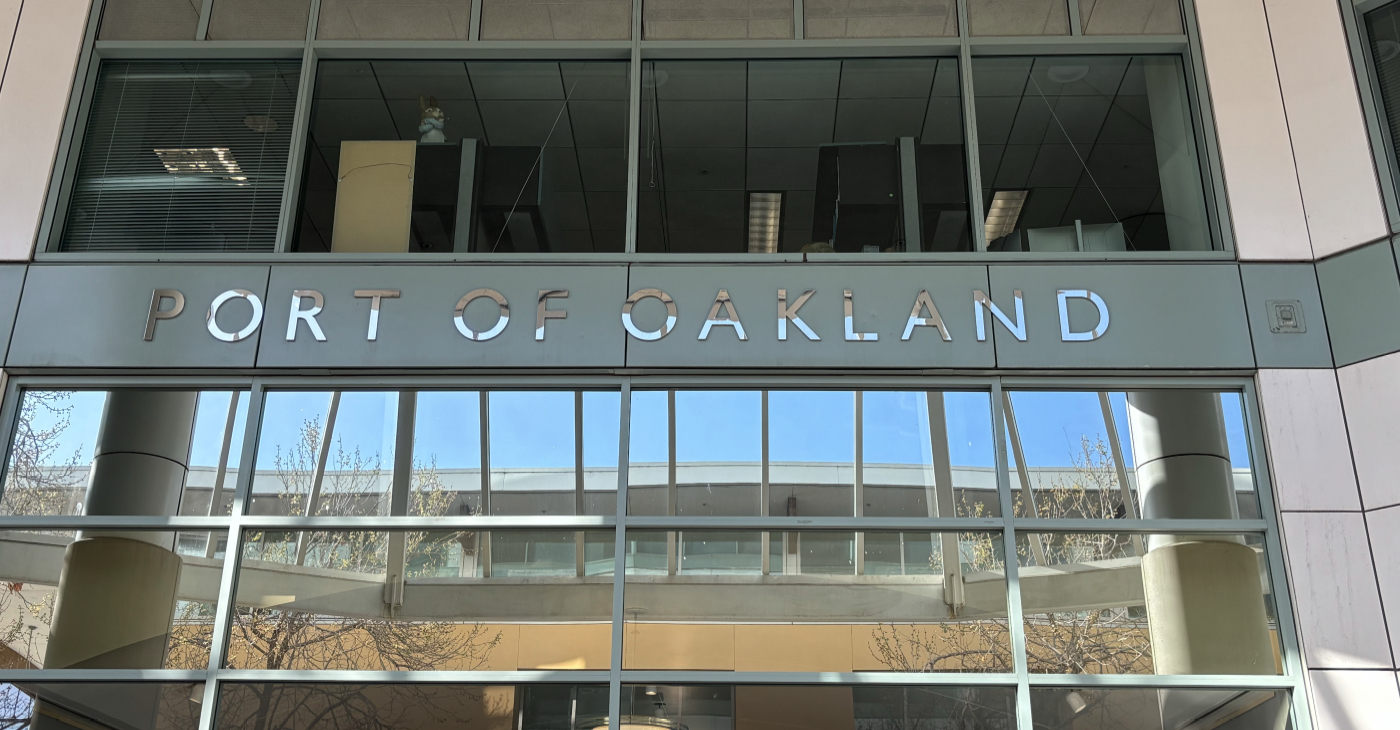
By Magaly Muñoz
The Port of Oakland Commission voted unanimously to change the name of Metropolitan Oakland International Airport to San Francisco Bay Oakland International Airport at a commission meeting Thursday afternoon.
The Port initially announced the name change on March 29, claiming that the change will attract more passengers and enhance the airport’s visibility. They contend that the airport often gets neglected by the public’s lack of knowledge of Oakland’s proximity to San Francisco.
“We want people to know where Oakland is and how beautiful our city is. We want them to visit, we want them to spend their money, and we want to keep our money into our local economy,” Port Commission President Barbara Leslie said at the meeting.
The commissioners shared anecdotal experiences and research to explain how this new name change will elevate and add to the growth of Oakland, not take away from their Bay Area neighbors.
The Port claimed that local residents had been asking for more options in domestic and international flights, but in order to do that, outside travelers need to be aware of Oakland’s presence first.
Since the announcement of the new name, San Francisco leaders strongly opposed the suggestion for a change, the City Attorney going as far as threatening legal action.
SF City Attorney David Chiu announced Monday that his team sent a letter to the Port of Oakland, writing that if Oakland goes forward with the name change, the city will go forward with a lawsuit to prevent the use of their trademarked name.
San Francisco owns U.S. federal trademark registrations for the marks “San Francisco International Airport”, the letter says.
Chiu further claimed that the name change will only cause confusion and chaos for travelers who are used to seeing the San Francisco name in the SFO trademark.
“We want to see the entire Bay Area thrive as a tourist destination and expand our offerings to visitors, but this proposal is not a legal or practical way to go about it. If Oakland moves forward with this proposal, San Francisco will pursue legal action to prevent misuse of our trademark,” Chiu said.
SF Mayor London Breed joined Chiu’s letter, stating that Oakland does not need to add the internationally popular city to its brand in order to grow its services.
“[Oakland] is rich in culture and wonderful people and has its own unique identity. It does not need the name San Francisco as part of its airport to stand out,” Breed wrote.
The Port defended its proposed actions, saying that if the vote did go forward, they would “take all appropriate measures to defend its right to use this accurate geographic identifier.”
“The proposed name modification will clarify, not confuse. The new name identifies where OAK is actually located, which is on the San Francisco Bay,” a spokesperson said on behalf of the Port.
Support for the name change extends beyond the Port. Several regional leaders, airlines and community members have come out in support of the name change, including Oakland Mayor Sheng Thao.
“This adjustment isn’t just about signage—it’s about inviting travelers to discover all that Oakland and the region have to offer. From our local dining scene to unique shopping spots and cozy hotels, there’s something here for everyone. Let’s work together to ensure that Oakland Airport continues to serve as a welcoming gateway for visitors and a source of pride for our community,” Thao said.
Because of public outcry amongst residents and leaders in Oakland and San Francisco before and during the Commission meeting, the Board decided to extend the second reading for the proposed name change from the end of April to the first meeting in May. This decision will allow commissioners to connect with community groups and leaders over their concerns for the change.
The Port Commission is scheduled to hold a second reading of the proposed name change on May 9.
-

 Activism4 weeks ago
Activism4 weeks agoOakland Post: Week of March 20 – 26, 2024
-

 #NNPA BlackPress3 weeks ago
#NNPA BlackPress3 weeks agoCOMMENTARY: D.C. Crime Bill Fails to Address Root Causes of Violence and Incarceration
-

 #NNPA BlackPress3 weeks ago
#NNPA BlackPress3 weeks agoMayor, City Council President React to May 31 Closing of Birmingham-Southern College
-

 #NNPA BlackPress3 weeks ago
#NNPA BlackPress3 weeks agoFrom Raids to Revelations: The Dark Turn in Sean ‘Diddy’ Combs’ Saga
-

 #NNPA BlackPress3 weeks ago
#NNPA BlackPress3 weeks agoCOMMENTARY: Lady Day and The Lights!
-

 #NNPA BlackPress3 weeks ago
#NNPA BlackPress3 weeks agoBaltimore Key Bridge Catastrophe: A City’s Heartbreak and a Nation’s Alarm
-

 #NNPA BlackPress3 weeks ago
#NNPA BlackPress3 weeks agoBaltimore’s Key Bridge Struck by Ship, Collapses into Water
-

 Activism3 weeks ago
Activism3 weeks agoOakland Post: Week of March 27 – April 2, 2024



